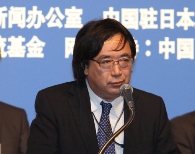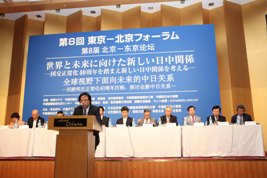A non-governmental forum between Japan and China has confirmed the importance of continuing private-sector dialogue to overcome difficulties between the two countries in order to develop stable relations.

About 100 influential figures and academics from Japan and China came up with what they call the ''Tokyo Consensus'' at the end of an annual two-day workshop in Tokyo on July 3, emphasizing an urgent need to strengthen mutual understanding and respect between the two countries' peoples to improve their bilateral relations.
The document, which wrapped up two days of discussions at the eighth meeting of the Tokyo-Beijing Forum, called for expanding "candid and sincere dialogue" in various fields between the two countries, particularly between politicians, business leaders, media people, youth and local government officials.
Private-sector dialogue between the two countries has a major role to play in helping to develop their relations while supporting efforts to build intergovernmental ties based on mutual understanding between the two peoples so that Japan and China can work together to forge a new global system, the document said.
It is self-evident that the two countries' governments cannot implement policies without their peoples' support, the document said. The peoples of the two countries should be aware that they are responsible not just for their society but also for the international society, said the Tokyo Consensus.
The workshop, jointly organized by The Genron NPO, a non-profit Japanese think tank, and China's state-run English-language newspaper, China Daily, comes at a time when the two Asian powers are marking the 40th anniversary of the normalization of their diplomatic relations this year as well as grappling with a number of politically touchy issues, notably a territorial problem involving a group of islets effectively controlled by Japan in the East China Sea.
Noting that Japan and China are geographically very close, and have more than 2,000 years of friendly relations and common cultural backgrounds, the two sides agreed that there are many common interests between the two countries as neighbors that are powerful in historical and geopolitical terms.
Participants also agreed that the two sides will continue dialogue to explore a way for the two countries to establish symbiotic and cooperative relationships from a long-term perspective, rather than being influenced by short-term feelings, and without losing sight of the ultimate target of building solid, trustful relations.
They committed themselves to not sparing any sincere efforts to find a practical solution to pending problems between the two countries from a long-term, mutually beneficial point of view.
Since various interchanges and dialogue in the private sector supplement diplomatic efforts by governments, the forum is ready to discuss pending problems between the two countries if they cannot be resolved by government while fulfilling a role for overcoming the obstacles, the document said.

The participants agreed that because the regional and international situations are undergoing complex changes, Japan and China should expand their cooperation in three aspects -- bilateral relations, Asia and the world -- from the point of view of having common interests, and actively promote efforts to build a free-trade area between Japan and China, and while trying to expand this initiative to other parts of Asia and to the world, contribute to the peace, stability and prosperity of the two countries, and the region.
To this end, it was agreed that the two countries should abandon the zero-sum thinking as two major powers in East Asia and strive to enhance the level of regional cooperation, and that they should contribute to promoting the Asian economy, ensuring regional peace and development, and maintaining a cooperative system among Asian countries.
The two sides agreed that stability in Asia is indispensable for the development and prosperity of this part of the world, and they noted that problems involving territories and maritime-related interests in Asia will adversely affect the foundation of regional stability.
It was agreed that a solution to these problems should be found through candid and sincere dialogue.
Noting that private-sector dialogue has "a special mission" that is different from that of government, the participants called on the two countries to build a firm mechanism for managing crises and cooling the situation as quickly as possible so as to keep confrontation and conflicts from developing.
The two sides agreed that they will continue discussions to prevent emotional repercussions between the peoples of the two countries from worsening over politically delicate problems, such as those over territories.
It was also agreed to launch a joint study to find ways for overcoming these obstacles and report its results to the next workshop.
Post a comment